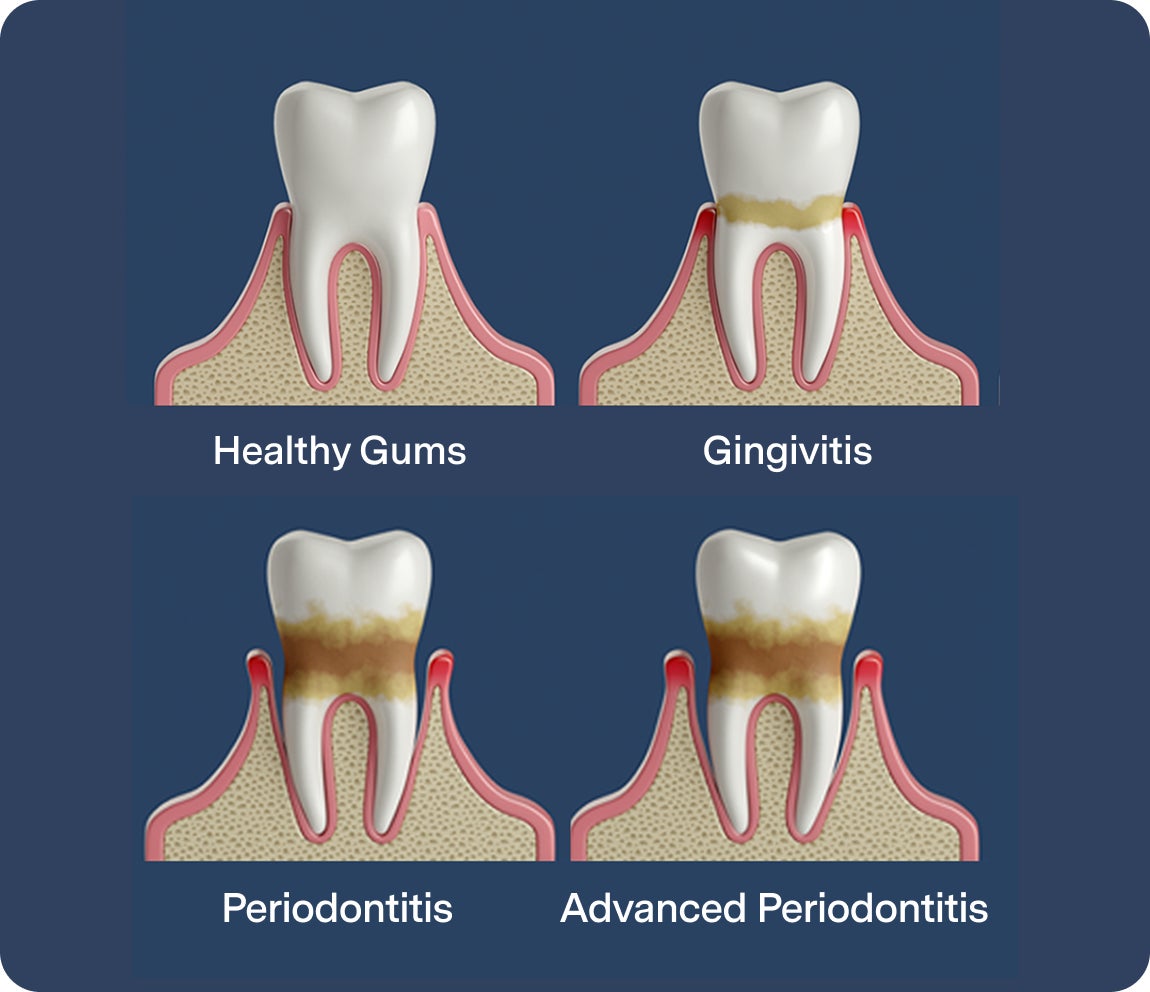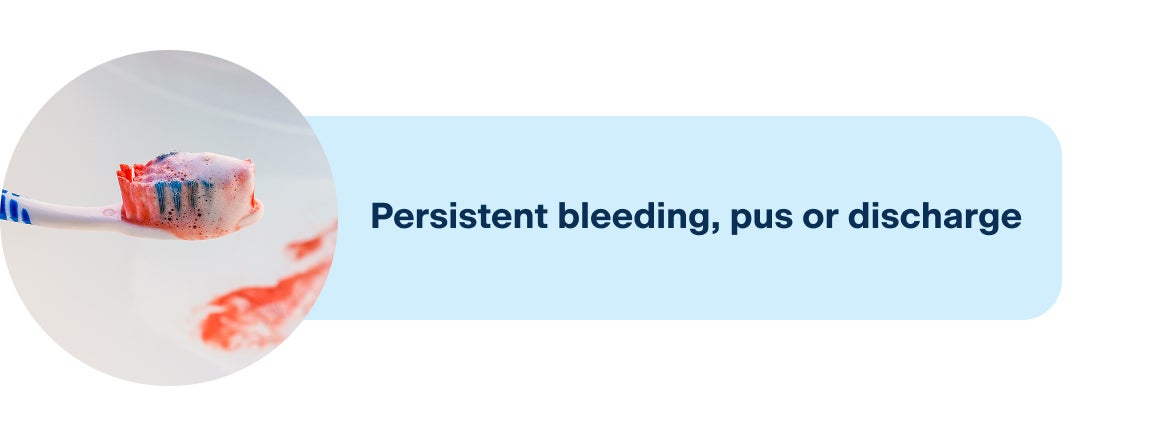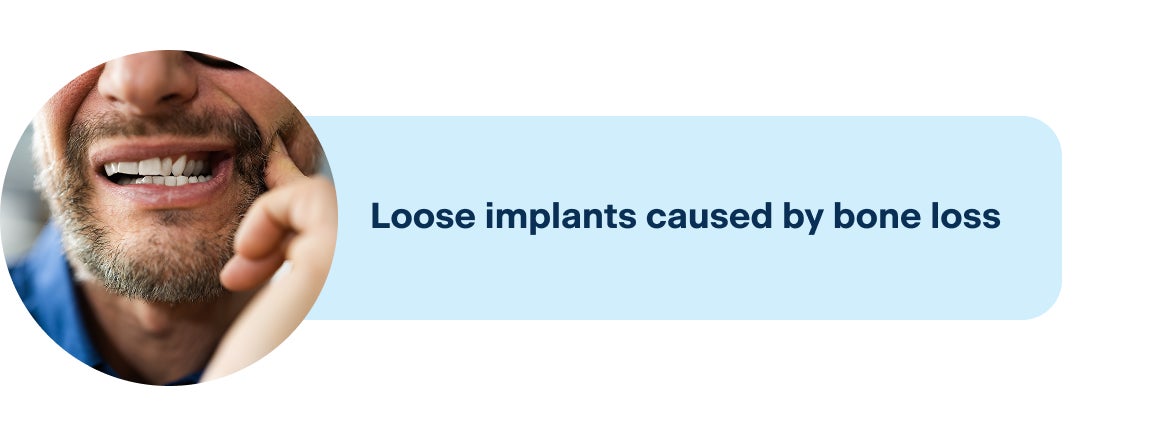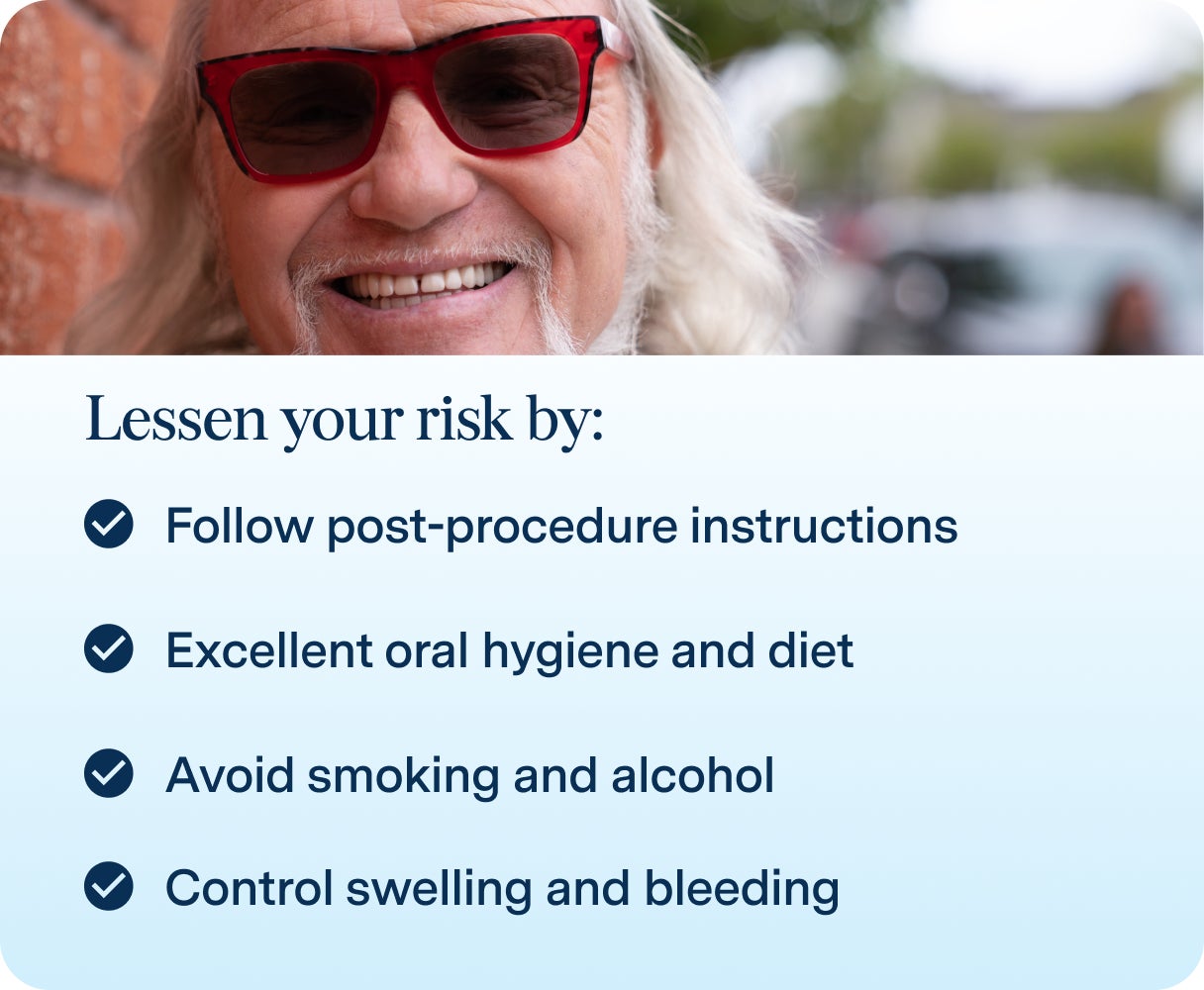Last updated 07.02.2025
How to treat a dental implant infection at home
Spot signs of dental implant infection early and manage discomfort. Seek professional care to address the root cause.

While rare, a dental implant infection is serious stuff. Left untreated, dental implant infections can lead to serious consequences, from implant failure to bone loss. If you suspect you have an infected dental implant, you should see a dentist as soon as possible. The infection will not improve on its own.
But there's no need to be afraid; ClearChoice is here to support you at every step. In this blog, we'll explore the signs of serious infection, help you know when to seek professional treatment, and practical home care tips to manage pain in the interim.
What causes dental implant infections?
Let's get to the root of the problem:
What is peri-implantitis and its causes
Peri-implantitis is the clinical term for a dental implant infection. A condition characterized by inflammation, it's a type of gum disease that affects the soft tissues and hard tissues around a dental implant. It can potentially lead to bone loss and, in severe cases, implant failure if left untreated. In extreme situations, the infection can potentially spread beyond the implant into the surrounding jaw and tissues of the face, potentially causing broader complications.
Peri-implantitis typically occurs when harmful bacteria accumulate around the implant site. These bacteria typically enter the surgical site during or after the implant procedure. Poor oral hygiene pre-existing periodontal disease (more commonly called gum disease), or complications during the implant placement procedure can all increase the risk of developing peri-implantitis.

Risk factors for infection
Several factors can make some individuals more susceptible to dental implant infections. These include smoking, uncontrolled diabetes, poor oral hygiene, a weakened immune system, or prior periodontal disease.
Additionally, improper aftercare following implant surgery can also elevate the risk of infection. That's why it's so important to follow your doctor's dental implant aftercare instructions after your surgery.
Common signs and symptoms of implant infection
Early detection can combat a dental implant infection. The goal is to treat the area as soon as possible to keep the infection from progressing because this can lead to damaging the bone around the implant. Here are some signs of dental implant infection and symptoms to watch out for:
Redness, swelling, tenderness
One of the early signs of implant infection is inflammation around the affected area. You might notice red, swollen, or tender gums that feel sensitive to the touch. These symptoms indicate the body’s response to bacterial overgrowth. When there is swelling and pain, infection is the first suspect.

Bleeding, foul taste, or pus
Persistent bleeding from the gums around an implant, along with the presence of pus or discharge with a foul taste or odor, often points to an active infection. You should not ignore these symptoms, as they usually mean worsening inflammation.

Loose implants and bone loss indicators
Peri-implantitis can cause long-term bone loss. By damaging the bone tissue around your implant, an infection can compromise its stability. If your dental implant starts to feel loose or unstable, it may indicate that the attachments to the teeth have become unscrewed, or it could be a sign of a more serious problem of underlying bone loss. It is not possible for you to diagnose why the implant feels “loose”. Come in ASAP to diagnose the issue and let your ClearChoice team rule out the possibility of infection, or proceed with treatment.

Can you treat a dental implant infection at home?
No. We cannot stress enough that if you suspect a dental implant infection, you should come for medical attention. However, there are some temporary dental implant infection home remedies to alleviate the pain while you wait for your appointment.
Limitations of home treatment vs. professional care
While some mild symptoms of infection can be managed temporarily at home, it’s important to understand that home remedies may only provide short-term relief. You'll need to address the infection to lessen the risk of long-term complications, like implant failure. Protect your investment and protect your oral health by scheduling a checkup with your nearest ClearChoice Dental Implant Center. That said, here are some ways to alleviate the pain.

Home remedies for mild implant infections
When you have an infected dental implant, pain relief is probably top of mind. While these infected dental implant home care tips are not cures, they might help you manage your symptoms while you await medical attention.
Warm saltwater rinses – How to do it and why it helps
A warm saltwater rinse for infection is a simple, effective way to reduce bacteria and soothe irritated gums. Mix half a teaspoon of salt into a cup of warm water, gently swish it in your mouth for 30 seconds, and repeat several times a day. Literally, rinse and repeat. This can help alleviate minor swelling and support healing.
Cold compress applications – reducing pain and swelling
Dental implant pain isn't cool, but dental implant pain relief can be; use an ice pack. Applying a cold compress to the outside of your cheek near the implant site can help reduce swelling and numb discomfort. Use a cloth-wrapped ice pack for 10-15 minutes, taking breaks in between to avoid tissue damage.
Over-the-counter pain relievers – safe choices and usage
For a dental implant infection, pain relief can often be the same methods you're used to. Non-prescription pain relievers like ibuprofen or acetaminophen can help manage pain and inflammation around an infected implant. Always follow the recommended dosage instructions and consult your dentist if symptoms persist.
Eating soft foods and avoiding irritants
Stick to a soft diet to reduce strain on the infected site. Avoid hard, crunchy, or spicy foods that could irritate the gums and worsen discomfort. Foods like mashed potatoes, yogurt, or soups are ideal while you heal.
Maintaining gentle oral hygiene
Continue brushing and flossing carefully around the implant site to lessen any plaque buildup. Avoid aggressive brushing, and use a soft-bristled toothbrush along with an antibacterial mouthwash. By keeping the area clean, you minimize the chance of infection.
When to see a dentist for a dental implant infection
Home remedies for gum infection will not solve the problem; dental implant infection treatment at home is just a stopgap. Here's when to see a dentist for implant infection: as soon as you suspect an infection.
Warning signs for professional treatment
If symptoms like persistent swelling, pain, or bleeding worsen or last for more than a few days, it’s time to consult a dentist. Other warning signs include looseness of the implant, extensive pus discharge, or fever.
Why home remedies aren’t a permanent fix
While home remedies can provide temporary relief, they aren’t a substitute for professional dental care. Treating the root cause of the infection requires a dentist. They're highly trained to perform cleanings, prescribe antibiotics, and execute other advanced interventions.

How to lessen the risk of dental implant infections
While dental implant infections only occur in about 5-10% of patients¹, we want to help keep you healthy. Here are a few key ways to avoid the rare possibility.
Source:
¹National Library of Medicine - Postoperative Infections After Dental Implant Placement: Prevalence, Clinical Features, and Treatment
Follow post-procedure instructions
Sticking to your dentist’s aftercare instructions following dental implant surgery helps lessen the risk of infections. This includes recommendations on hygiene, diet, and medications.
Excellent oral hygiene and diet
Good oral hygiene is always the best frontline defense. Make sure to brush, floss, and use antibacterial rinses as prescribed by your doctor, like a hydrogen peroxide rinse. Pair this with a healthy diet to help boost your immune system and overall oral health.
Avoid smoking and alcohol
Smoking and excessive alcohol consumption can delay healing and increase infection risks. Quit smoking and limit alcohol intake during and after your recovery period to promote a successful implant integration.
Control swelling and bleeding
Use cold compresses to manage post-operative swelling. This can lessen the risk of complications at the implant site, reducing the likelihood of infection.
Schedule free consultation>
Dental Implant Infection FAQs
Can salt water cure an infected dental implant?
While saltwater rinses can reduce bacteria and soothe inflammation, they cannot cure an infection. You'll need professional dental care to address the root cause.
Is a dental implant infection an emergency?
A dental implant infection can become an emergency if symptoms are severe. If you're suffering from intense pain, fever, or looseness of your implant, seek immediate dental care.
How long do dental implant infections last?
With timely professional treatment, mild infections can resolve in a few days. However, untreated infections may persist and lead to serious complications, including implant failure and bone loss.



